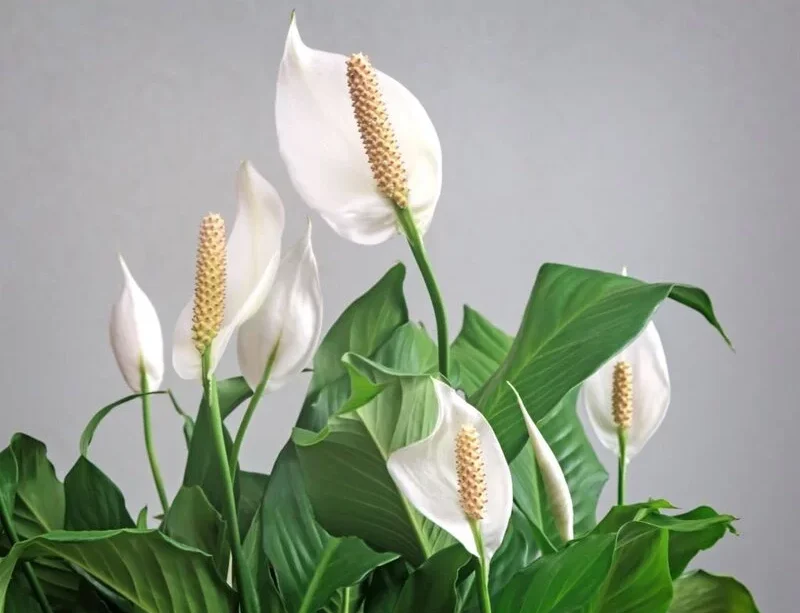Peace lilies, with their serene, elegant appearance and lush, green leaves, are more than just a pretty face. They have the fantastic ability to bloom stunning, white flowers that can bring a sense of calm and peace into any space. However, getting them to bloom can sometimes feel like a mystery. But don’t worry! This guide will help you uncover the secrets of encouraging your peace lily to show off its beautiful blooms.
- 🌱 PERFECT BLEND OF NUTRIENTS – Give your succulent plants everything they need to grow up healthy! Our 3-1-2 liquid concentrate has all of the essential nutrients that your plants crave.
- 🌱 MIX WITH WATER – Designed to blend with water to provide a single application to use every other watering cycle. 1-2 tsp per 8 cups water.
- 🌱 SUITABLE FOR ALL VARIETIES – You can use our fertilizer on just about any kind of succulent plant. It’s great for seedlings and mature plants alike.
- 🌱 SPECIALLY DESIGNED PREMIUM FORMULA – Special blend enables maximum absorption for plant growth and vitality.
- 🌱 DURABLE PACKAGING – This liquid concentrate comes in a sturdy, 8 oz sealed bottle. Store it in a safe, dry place and you can count on it to stay in great condition for a long time to come.
Peace Lilies: An Overview
Peace lilies, also known by their scientific name Spathiphyllum, are native to the tropical rainforests of America and Southeast Asia. They are not true lilies but belong to the Araceae family. This plant is an easy-to-care-for houseplant and is well-loved for its dark green leaves and white, spoon-shaped flowers, which are actually a type of leaf called a bract. Understanding this plant’s natural environment and growth habit is the first step to encouraging blooming. So, let’s dive in and learn more about our green friends, the peace lilies.
Ideal Conditions for Peace Lily Blooms
In nature, peace lilies are used to living under the canopy of tropical rainforests. This means they like warm temperatures, high humidity, and indirect light. They don’t like cold drafts or direct, bright sunlight, which can scorch their leaves. If you want your peace lily to bloom, the first thing you need to do is to make sure it’s in the right environment. Try to mimic the rainforest in your home as much as possible. Keep your peace lily in a warm place, away from drafts, and make sure it gets plenty of light, but not direct sunlight. Remember, even the best care won’t make a peace lily bloom if it’s not in the right environment!
Essential Care Tips to Encourage Peace Lily Blooming
The next step in getting your peace lily to bloom is to provide it with the right care. This involves watering, feeding, and grooming your plant. Here are some tips:
- Watering: Peace lilies like their soil to be kept moist, but not soggy. Overwatering can cause root rot, while underwatering can make the plant wilt. So, water your peace lily when the top inch of soil feels dry to the touch.
- Feeding: During the growing season (spring and summer), feed your peace lily with a balanced houseplant fertilizer once a month. This will provide the nutrients it needs to produce blooms.
- Grooming: Remove any yellow or brown leaves, as they can drain energy from the plant. Also, once the flowers have faded, cut them off to encourage the plant to produce more.
- Patience: Last but not least, remember that peace lilies won’t bloom all the time. They typically bloom in the spring, and the flowers can last for several weeks. But after that, the plant will need a rest period. So be patient, and give your peace lily the care it needs, and it will reward you with its beautiful, serene blooms.
- 100% NATURAL: Potting blend for Spathiphyllum (Peace Lily Plant), no chemicals or artificial fertilizers
- USES: Specially formulated for growing healthy Peace Lilies, for indoor / outdoor container gardening
- BENEFITS: Nutrient retention, aeration to roots, pH balance, and organic matter
- Ingredients: Pine bark, peat moss, perlite, sand, and lime
- Size: 2 quarts (enough for three 5-inch pots or 2 6-inch pots)
Troubleshooting Common Problems That Prevent Blooming
Just like people, plants can get a little grumpy if they’re not happy with their surroundings. If your peace lily is reluctant to bloom, it might be trying to tell you something. Here are a few common problems to look out for:
- Lack of Light: While peace lilies enjoy the shade, they do need some light to bloom. If your plant is in a very dark spot, consider moving it to a brighter location, but avoid direct sunlight.
- Over or Under Watering: Remember, peace lilies enjoy a drink, but they don’t like to swim. If the leaves are yellowing, you may be watering too much. If they’re brown and crispy, it might be too little. Adjust as necessary.
- Nutrient Deficiency: Peace lilies aren’t heavy feeders, but they do appreciate a monthly feed during the growing season. A lack of food could prevent blooms.
- Age: Like a fine wine, peace lilies need time to mature. If your plant is new, it may not be ready to bloom yet. Give it time!
The Importance of Patience in Getting a Peace Lily to Bloom
Just like watching a pot waiting for it to boil, staring at your peace lily and willing it to bloom might be tempting, but patience is key. Keep providing your peace lily with the right conditions and care, and it’ll bloom when it’s ready. Remember, plants have their own timeline, and nature can’t be rushed.
Peace lilies are not just about their showy flowers. Their lush, green foliage is beautiful in its own right. So while waiting for those blooms to appear, take a moment to appreciate the plant as a whole. After all, gardening is not just about the destination, it’s about the journey. And in this journey, patience truly is a virtue. So keep caring for your peace lily, and in time, it will reward you with its stunning flowers.
Frequently Asked Questions About Peace Lily Blooming
Why is my peace lily not blooming even with the right conditions?
Sometimes, peace lilies just need a little extra time. As long as you’re giving it the right light, water, and nutrients, be patient. It will bloom in its own time.
Is it normal for a peace lily not to bloom in winter?
Yes, it’s normal. Peace lilies usually bloom in the spring and summer. During winter, they focus their energy on staying healthy rather than blooming.
Can peace lilies bloom more than once a year?
Yes, peace lilies can bloom multiple times a year, especially if they’re happy with their conditions.
I’ve moved my peace lily to a brighter spot, but it’s still not blooming. Why?
Be careful not to give your peace lily too much light. Direct sunlight can burn their leaves. Try a spot with bright, indirect light instead.
Conclusion
Getting a peace lily to bloom can sometimes feel like a challenge, but remember, it’s all about creating a happy and healthy environment for your plant. With the right light, proper watering, and a little patience, you’ll soon be rewarded with those beautiful, white blooms. Happy planting, and don’t forget to enjoy the journey!





